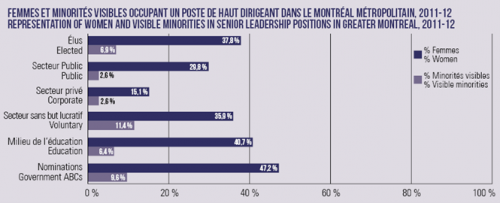Few women, visible minorities among top decision makers

While women have gained ground, accounting for 31.2% of senior leadership roles in Montreal, visible minorities remain more markedly underrepresented in these ranks. In spite of accounting for 22.5% of the population, only 5.9% of senior leaders were visible minorities according to a study led by researchers from McGill University's Desautels Faculty of Management and Ryerson University's Diversity Institute.
The study examined 3,025 senior leaders from the largest organizations in Greater Montreal in six sectors - elected, public, private, voluntary, education, and appointments to agencies, boards and commissions, located in areas of Greater Montreal with visible minority population exceeding 10%.
Women and Visible Minorities in Senior Leadership Positions: A Profile of Greater Montreal is the second in a series from DiversityLeads, a five-year Community University Research Alliance (CURA) project supported by Canada's Social Sciences and Humanities Research Council (SSHRC), which will produce new knowledge that informs evidence-based approaches to promoting diversity in leadership.
"Previous research has shown a clear link between diversity in leadership and a number of social and economic benefits. Diverse leadership improves organizational financial performance and stimulates innovation, among other well-documented benefits," says Dr. Suzanne Gagnon co-author of the report, and professor at the Desautels Faculty of Management, McGill University.
"The importance of this research is underscored by RBC's own studies, and how we address diversity at RBC affects our ability to attract talent and continue to grow. Having a workforce that reflects the population and the communities we serve, and an inclusive workplace that offers all employees the opportunity to reach their potential, is simply the right thing to do. But leveraging diversity is more than that, it's smart business." says Martin Thibodeau, President, Quebec Headquarters, RBC Royal Bank of Canada
This research also found significant variances between sectors and within sectors in Greater Montreal. Women represented 47.2% of appointments to agencies, boards and commissions, but were only 15.1% of the leaders in the largest private sector organizations analyzed. Within the private sector, almost one third had no women in senior management roles while 5.6% had over 40%.
Visible minorities represented 11.4% of the voluntary sector leaders in contrast to 2.6% in the public and private sector organizations studied. Although female visible minorities account for 11.5% of the Greater Montreal population, they represent a mere 1.9% of the total leaders analyzed across all six sectors.
"Our study of leading practices has shown that diversity is not just an HR issue. Leading organizations think of diversity and inclusion as a strategic imperative shaping every aspect of the organization from procurement to product and service development, marketing and communications. We need to not only examine our recruitment, hiring, and promotion practices but how we build the talent pipeline to leadership," notes Dr. Wendy Cukier, co-author, VP Research and Innovation, and Founder of the Diversity Institute, Ryerson University.
"This research emphasizes the value of diverse representation in an organization. In business, as in politics, diversity is essential for growth, and those who embrace it, will be the most successful," said the Hon. Marlene Jennings, Member of Parliament for Notre-Dame-de-Grâce/Lachine from 1997-2011, currently research advisor and Executive Director at YM-YWHA, Montreal Jewish Community Centres.
Provided by McGill University















